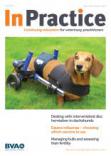
Other possible diagnoses
It's really important that your dog gets the right diagnosis, quickly. In a survey among Dachshund owners on our Facebook Group, only half the IVDD cases were correctly diagnosed by their general practice vet on first presentation. Shockingly, a quarter of vets incorrectly diagnosed the problem, for example saying it was muscle pain, arthritis or a stomach problem. Some dogs have presented with anal gland problems which the vet may empty but the underlying pain, due to IVDD, remains. A further quarter of vets were unsure about the symptoms at first examination.
Dr Marianne Dorn has provided a downloadable guide on how best to help the dachshund presenting with back disease. It’s written for first-opinion vets in practice and can be found in the March 2019 edition of In Practice journal.
A pdf version of this paper may be downloaded for educational purposes by clicking here
To cite the attached article: “Dorn, M., 2019. First-opinion approach to the dachshund with intervertebral disc herniation. In Practice, 41(2), pp.59-68″
Marianne says "Intervertebral disc herniation (IVDH) is by far the most likely diagnosis for dachshunds presenting with no history of trauma and with both pain and pelvic limb
paresis. A
presumptive diagnosis of IVDH can usually be reached based on history and clinical
examination, although mild cases can be challenging to differentiate from those with
non-spinal causes of pain."
In the diagnostic flowchart there are some key questions that might rule out a herniated disc:
- If the dog is not mentally alert, this is more likely to indicate other diagnoses: e.g. cardiac, metabolic, toxic or intercranial
- If the dog's temperature is abnormal, this may lead to alternative or concurrent diagnoses
- If the dog's head is tilted or turned, or if there is facial asymmetry, this may suggest other neurological conditions
Atlanto-axial Subluxation
This is a condition more usually found in toy breeds but has been reported in Dachshunds (through our online health reporting system). Symptoms include neck pain, crying, yelping and rigidity of the neck. While it can be detected by X-ray, it is usually confirmed by CT scan and can either be treated conservatively or with surgery.
Willows Referrals have a useful summary here.
Myelomalacia
Myelomalacia is a condition that can occur after a spinal cord injury. It is more likely to develop in dogs that have complete paralysis and sudden loss of deep pain sensation (Grade 5). Read more here.
Meningitis
Meningitis is an inflammation of the membranes that cover the brain and spinal cord. It can be caused either by bacterial or viral infections, or it may be an immune-medited response. Signs include loss of appetite, fever, lethargy, genaral pain, and stiffness in the neck. It is, generally, rare in dogs and this would be an unusual diagnosis in a Dachshund. More information here.


